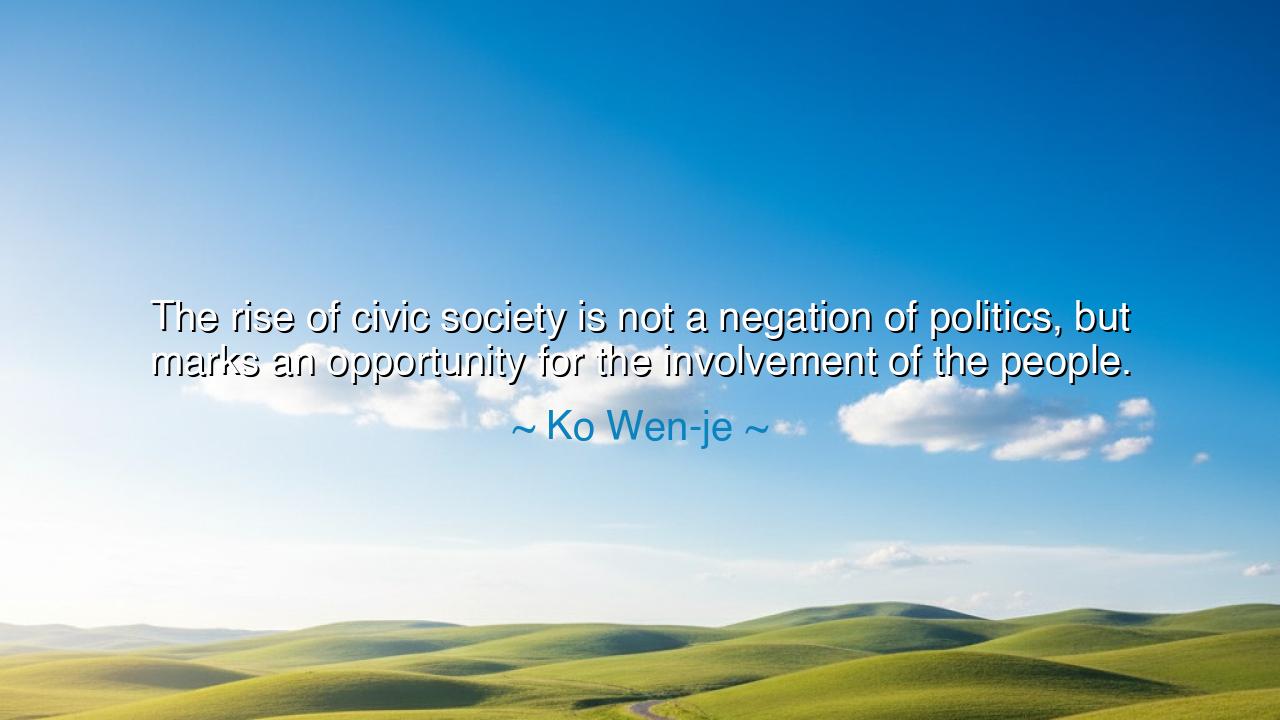
The rise of civic society is not a negation of politics, but
The rise of civic society is not a negation of politics, but marks an opportunity for the involvement of the people.






Ko Wen-je, physician turned statesman, spoke with clarity when he declared: “The rise of civic society is not a negation of politics, but marks an opportunity for the involvement of the people.” In these words, we hear both a rebuke and a call to action. Too often the people believe that when citizens take to the streets, when communities unite in voice and deed, they are opposing the realm of politics. But Ko reminds us that such movements do not weaken democracy—they strengthen it. For politics is not the private game of rulers; it is the shared labor of an entire people.
The meaning is clear: civic society—those unions of ordinary men and women, associations, charities, protest movements, student groups, and voices of conscience—is not the enemy of governance, but its lifeblood. When citizens step forward to demand justice, to organize relief, to protect freedoms, they are not rejecting politics; they are fulfilling its truest form. For what is politics if not the art of living together? And how can it be whole if the people themselves remain silent?
History has proven this truth again and again. In Poland, during the long years of communist rule, the Solidarity movement arose from the shipyards of Gdańsk. It began as a trade union, a force of civic society, demanding fair treatment for workers. But soon it grew into a national voice, challenging the corruption of the state. Though it was not born in parliament halls, its work was profoundly political, and in time, it reshaped the nation, bringing freedom where once there was oppression. Here we see Ko’s wisdom: civic society does not negate politics—it creates the space for the people’s involvement.
Another great example lies in the American civil rights movement. Citizens—students, ministers, mothers, workers—took to the streets, not with armies, but with marches, boycotts, and speeches. Their actions were not against politics, but for it. They forced their nation to confront its own laws and demand better ones. Without that rise of civic society, the halls of government would have remained silent, and justice delayed even longer. It was the people’s involvement that awakened the conscience of the state.
Ko Wen-je’s words also serve as warning. When civic society is silenced, when voices of the people are crushed by fear or apathy, politics becomes hollow. It decays into the game of elites, where decisions are made without the people’s consent. Such politics is tyranny dressed in ceremony. But when civic movements rise, they bring renewal, reminding rulers that power flows not from palaces, but from the consent of the governed.
For us, the lesson is profound: do not imagine that your duty ends with casting a vote or watching from the sidelines. Democracy is not a spectacle to be observed—it is a flame to be tended. Join the unions, the charities, the neighborhood groups, the movements for justice. Write, speak, march, organize. By doing so, you prove Ko’s words true: the rise of civic society is the moment when politics becomes real, when the people take their rightful place in shaping their destiny.
Practical action lies close at hand. If you see injustice, do not wait for rulers alone to solve it—gather others and make your voice heard. If your community struggles, do not assume distant officials will notice—be the hands that mend and build. And above all, believe that your efforts, however small, are part of the greater story of your society. For history belongs not only to leaders, but to all who dared to be involved.
Thus, let Ko Wen-je’s words burn like a beacon: the rise of civic society is not a negation, but an opportunity. Seize that opportunity. For when the people rise—not in hatred, but in unity—the realm of politics is not diminished, but transformed. And in that transformation lies the promise of freedom, dignity, and a future worthy of those yet to come.






AAdministratorAdministrator
Welcome, honored guests. Please leave a comment, we will respond soon